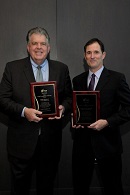
Swisher Hygiene (“Swisher” or the “Company”) performs a wide variety of essential hygiene and sanitation services to about 60,000 customers coast-to-coast.
In late 2014, Swisher Hygiene’s Nasdaq share price dropped below $2 for the first time ever (from a high of $114 in 2011; ticker SWSH) and company and was low on cash.
Swisher was formed in 2010 by legendary industry roll-up veterans Wayne Huizenga and Steve Berrard who did successful industry roll-ups with Blockbuster Video, Waste Management and AutoNation. The Company purchased more than 54 businesses from 2011 with a value of more than $220 million from the funds raised during their IPO. Former Florida governor, Jeb Bush was also on the board until both he and chairman Huizenga resigned in 2013 after ousting CEO Steve Berrard in 2012 amid reports of financial irregularities. Earnings for 2011 had to be restated to increase its loss by $4.8 million. The Company continued to lose an average of $75 million per year from 2011 to 2014, which made it one of the most popular stocks for short sellers on Wall Street with a short interest ratio of 31% in 2014.
Investors and analysts grew increasingly pessimistic on Swisher’s ability to remain solvent, while their competitors waited for the company to implode so they could take over its customers.
Then in Q3 of 2014, Swisher secured a conditional line of credit, which provided it with a small window of opportunity to execute a turnaround. However, the Swisher board was questioning the amount of inventory carried after burning through another $7.6 million of cash in Q3 in 2014.
The new Chief Operating Officer Blake Thompson approached Global Turnarounds to establish what the ideal Swisher inventory level should be for its five manufacturing plants and more than 70 distribution warehouses. An inventory simulation confirmed that Swisher could release $8.4 million in cash within one year from their inventory by running their supply chain on modern lean principles.
Starting February 2015, Thompson asked Global Turnarounds to not only focus on releasing cash from inventory, but also introduce a continuous improvement program for the 1,200 people of Swisher to ensure that the changes in business processes could be sustained internally, and to keep the Swisher team together during a time when morale was low with many people resigning or lured away by competitors.
Swisher’s employees quickly learned how to run Kaizen events to improve the output per shift by 50%; doing Spaghetti diagrams to cut the batch-making times by 60%; releasing purchase orders at the right trigger points, and much more. Some teams reduced their inventory by 50% while also improving fill rates. At the end of Q2 of 2015, the result was a cash positive quarter. It enabled Swisher to be sold to industry giant Ecolab in a $40 million cash deal in November 2015. In a final ceremony, belts were awarded to employees under the new Swisher continuous improvement program.
The Swisher brand name and the majority of its people continue to operate as an autonomous unit for the new owners.